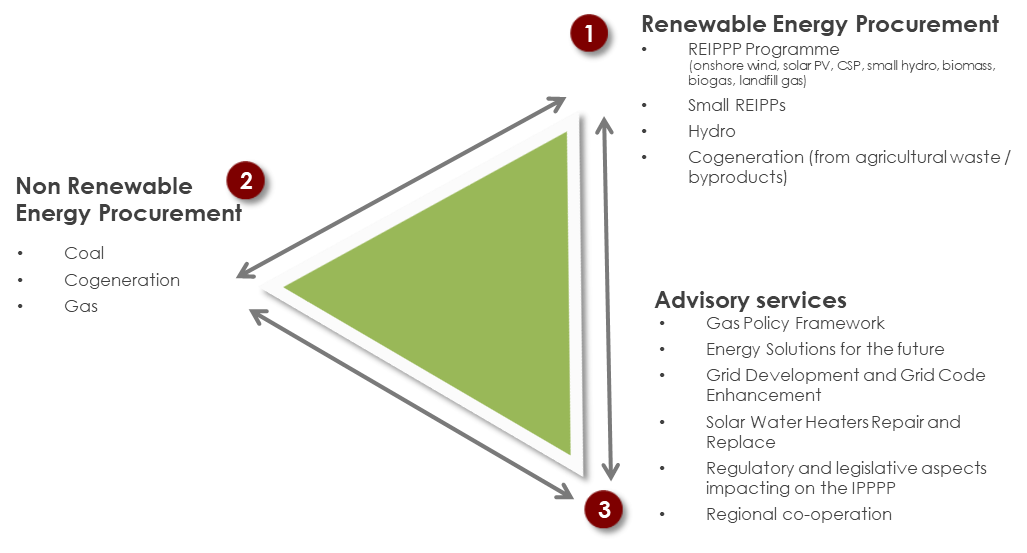The National Development Plan (NDP) identifies the need for South Africa to invest in a strong network of economic infrastructure designed to support the country’s medium- and long-term economic, social and environmental goals. Energy infrastructure is a critical component that underpins economic activity and growth across the country, and it needs to be robust, extensive and affordable enough to meet industrial, commercial and household needs.
In formulating its vision for the energy sector, the NDP took as a point of departure the Integrated Resource Plan for electricity (IRP) 2010 to 2030 as promulgated in March 2011. This was subsequently updated and the promulgated IRP 2019 replaced the IRP 2010 in October 2019 as the country’s official electricity infrastructure plan to 2030.
As with the IRP 2010, the IRP 2019 proposes a diverse energy mix with which to meet the country’s electricity needs to 2030. Specifically, the IRP 2019 identifies 39 696 MW to be added to the national grid between 2019 and 2030. This includes 8 208 MW (20.7%) that has already been committed or contracted under IRP 2010 for grid connection between 2019 and 2022, as well as 31 488 MW (79.3%) of new additional capacity that has to be added between 2019 and 2030.
To give effect to the procurement process and implementation of the relevant capacity allocations of the IRP, the Minister of Mineral Resources and Energy (in consultation with the National Energy Regulator of South Africa) determines new electrical energy generation capacity requirements, as allowed by Section 34 of the Electricity Regulation Act No.4 of 2006. The determinations further specify whether the new generation capacity shall be established by Eskom, another organ of state or an independent power producer (IPP).
Prior to the release of the promulgated IRP 2019, the procurement of electrical energy from IPPs was informed by Ministerial determinations made in alignment with the IRP 2010, however, the electrical capacity that has not already been contracted before the promulgation of the IRP 2019 has expired. New Ministerial determinations, with the concurrence of NERSA, will give effect to the capacity allocations stipulated in the IRP 2019.
In that regard, two Ministerial determinations has been promulgated, following concurrence by NERSA. A total of 13 813 MW has been determined, which represents 43.9% of the total 31 488 MW target for new additional capacity that has to be added by 2030 as stipulated in the IRP 2019.
The first determination, promulgated on 14 May 2020, calls for the procurement of 2 000 MW from a range of technologies, to fill the short-term capacity gap.
A second determination, which was promulgated in September, allows for procurement from the following technologies, for the short and medium term:
The Independent Power Producers Procurement Programme (IPPPP) Office and mandate
The Department of Mineral Resources and Energy (DMRE), National Treasury (NT) and the Development Bank of Southern Africa (DBSA) established the IPP Office for the specific purpose of delivering on the IPPPP objectives.
In November 2010 the DMRE and NT entered into a Memorandum of Agreement (MoA) with the DBSA to provide the necessary support to implement the IPPPP and establish the IPP Office. A new MoA was agreed upon by all parties in May 2016 for an additional 3-year period, then again in April 2019 for another year, and in March 2020 it was extended for an additional 3-year period to 2023.
The programme’s primary mandate is to secure electrical energy from the private sector for renewable and non-renewable energy sources. With regard to renewables, the programme is designed to reduce the country’s reliance on fossil fuels, stimulate an indigenous renewable energy industry and contribute to socio-economic development and environmentally sustainable growth.
The IPPPP has been designed not only to procure energy, but has also been structured to contribute to the broader national development objectives of job creation, social upliftment and broadening of economic ownership.
The scale and scope of electricity infrastructure development under the IPPPP extend beyond the national footprint to the establishment of broader regional linkages and partnerships. Active engagement and collaboration has occurred with, amongst others, the South African Development Community (SADC), African Union (AU) and South African Power Pool (SAPP). Bilateral relations are also being pursued in support of cross-border project collaboration and capacity support, knowledge sharing and skills enhancement.
The programme is contributing to the security of energy supply and ensuring a diversified energy mix through the procurement of significant additional renewable energy and non-renewable generation capacity from the private sector.
The IPP Office provides the following services:

The IPP Office has three interrelated focus areas:
The IPPPP provides a flexible procurement service to the Department for a responsive and effective reply to the urgent power infrastructure development needs of the country, therefore our activities will continue to evolve in order to effectively respond to the planning and development needs in the current energy context.